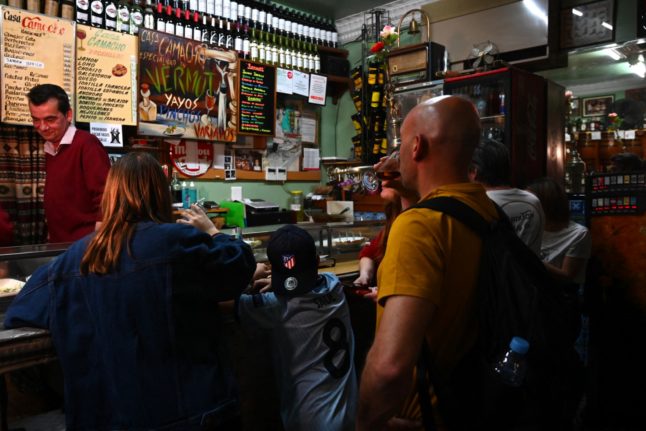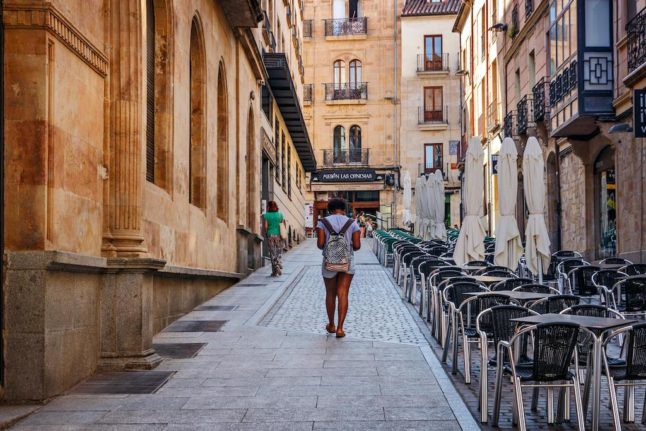Whether it be a classic caña or glass of the finest Spanish wine, you might’ve noticed that Spaniards love their alcohol. In fact, in Spain it’s not uncommon to see someone enjoying an alcoholic drink with their tostada in the morning, or sipping a vermouth before midday, or sharing a bottle of wine over lunch, or a … you get the idea.
Take a stroll through any Spanish town and city at any time of day and what do you see? Invariably (unless it’s raining) you’ll see locals out on the terrace chain-smoking and enjoying a few drinks, and that makes sense as Spain is one of the places with the highest number of bars per capita in the entire world: 1 per 173 people, according to the data from Spain’s National Statistics Institute (INE).
If you’re a foreigner in Spain, you might have also noticed that though they do love a tipple, Spaniards also seem to have an entirely different relationship with alcohol than in many other countries – that is to say, many of them drink most (if not every) day but rarely seem to suffer any of the negatives associated with heavy drinking.
But why is that?
READ ALSO: EXPLAINED: Spain’s beer culture and the emergence of craft brewers
Frequently in moderation
According to European health interview survey (EHIS), 13 percent of Spaniards drink alcohol every day, making them the second most frequent drinkers in the whole of the European Union. For men in the 55-64 age bracket, that number rises significantly to 16.8 percent, data from Spain’s Ministry of Health shows.
In fact, only Portugal finished ahead of the Spanish in terms of daily consumption (20.7 percent of Portuguese people drink alcohol on a daily basis), and Spaniards finished just ahead of their Mediterranean neighbours Italy (12.1 person). Overall Spain finished well above the European average: 8.4 percent of the EU population drink alcohol every day.
And yet despite that Spaniards have among the longest life expectancy globally and are forecast to have the longest life expectancy in the entire world by 2040 – with a projected average lifespan of nearly 85.8 years.
Alcoholism in Spain
It should be said that there are alcoholics in Spain, of course.
According to figures from the Abbey Care Foundation, the alcoholism rate among Spanish men is 1.07 percent, but that seems a disproportionately low rate when compared to both other countries and the frequency with which Spaniards drink. For context, in Russian men the rate is 16.29 percent; in the UK, 6.42 percent; Ireland, 4.84 percent; and Germany, 4.51 percent.
The rate among Spanish women is minuscule (0.17 percent) which gives an average of 1.24 percent, good enough for 142nd overall in the rankings and sandwiched between Guinea and Gambia.
That 1.24 percent average works out to roughly almost 600,000 people suffering with alcohol use disorder (AUD) in Spain.
It seems fair to say that generally speaking, on a cultural level the Spaniards seem to be able to simultaneously drink every day without suffering high levels of alcoholism. But how is that possible?
How can Spaniards drink the second most (frequently) in Europe and yet live so long? How is it they can drink much without, seemingly, suffering so many of the negative consequences? How can they drink everyday without being alcoholics?
READ ALSO: ¡Salud! The different ways to say cheers in Spanish
Moderation not bingeing
There are several possible explanations.
One is that though Spaniards drink more regularly than other nations, their intake is not as excessive as elsewhere. According to the EHIS survey data, the Danes (37.8 percent), Romanians (35 percent), Luxembourgers (34.3 percent) and Germans (30.4 percent) are the most excessive alcohol consumers in Europe (defined as ‘heavy episodic drinking’). In Spain, the figure is just 6 percent.
What does that mean? Put simply, Spaniards drink very regularly but in moderation. Unlike in Russia or the UK or Ireland, in Spain the concept of ‘going for one’ really does exist, and many Spaniards seem content to have one or two drinks before switching to water or soft drinks or even going home, unlike in harder drinking countries where one drink leads to another and… you know the rest.
If you’ve spent time in Spain, you’ve probably also noticed that Spanish society doesn’t often see the negative byproducts of binge drinking cultures prevalent in other countries, such as fighting or vomiting in public, or visibly drunk people out and about in the streets.
READ ALSO: Spaniards are the OECD’s third biggest consumers of cocaine and alcohol
Social drinking
Spaniards are social people, and their alcohol habits reflect that. The urban planning in most Spanish neighbourhoods is centred around people, public spaces and, of course, bars, but the effect is that alcohol is a complement to socialising not the anchor for it.
For many Spaniards, socialising is something done fluidly. People pop in and out of events and meet-ups, go up to their flat, come back down, move on and see other people, all while maybe having a drink or two at most. The idea of the ‘session’ style drinking popular in the UK, Ireland and Germany doesn’t really exist here.
Similarly, for many Spaniards the only time they’d consider drinking would be in a social setting. Old men drinking their carajillos aside, in Spain the culture of drinking alone isn’t quite as normalised as elsewhere.
Drinking with food
If the Spanish love anything more than drinking, it might be eating. This could also be an explanation as to how the Spaniards can drink so regularly without feeling the consequences (or ever getting very drunk, it seems).
For many Spaniards a beer or glass of wine is the perfect accompaniment to food, and drinking without a tapa to nibble on is unimaginable.
Una sin porfa
Though they are becoming more popular around the world, Spain is light years ahead when it comes to non-alcoholic beers. Ordering una sin (literally ‘one without’) as they’re referred to in Spanish is completely normal and has been for many years. In fact, often Spanish bars will have non-alcoholic beers on tap, and ordering una sin doesn’t raise eyebrows in the same way it might elsewhere.
Similarly, on an anecdotal level, at least, Spaniards seem less pushy about alcohol. Because the binge culture doesn’t exist, there’s little peer pressure to try and make others drink, and in exactly the same way that nobody cares if someone is drinking beer at nine in the morning, in Spain nobody cares (or says anything) if someone fancies una sin or soft drink on a night out.
Like so many things in life, Spaniards seem to have struck the perfect balance when it comes to drinking – ¡Salud!



 Please whitelist us to continue reading.
Please whitelist us to continue reading.
Member comments